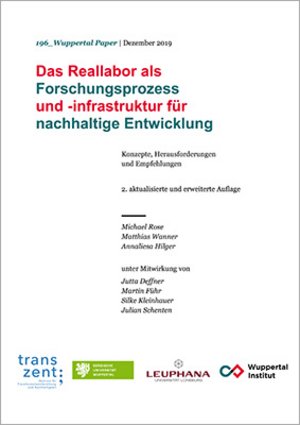Das Reallabor als Forschungsprozess und -infrastruktur für nachhaltige Entwicklung
Konzepte, Herausforderungen und Empfehlungen

The Great Transformation towards sustainability is a challenge for society as a whole, and science is also required to address it. For this reason, the German Federal Ministry of Education and Research (BMBF) has launched the "Sustainable Economy" (NaWi) funding programme to support science and practice in meeting this challenge.
A new format for designing this cooperation between science and practice as a contribution to sustainable development is the so-called real-world laboratory. This is where actors from science and practice come together to jointly develop and test solutions for a real-world sustainability problem. Based on the conceptual and empirical real-world laboratory research of the NaWi project "Well-Being Transformation Wuppertal" (WTW), the experiences and findings from the NaWi projects WTW, KInChem and WohnMobil as well as the latest scientific literature on real-world laboratories were synthesised. The resulting study at hand offers readers a comprehensive overview of the design and implementation of real-world laboratories.
First, existing real-world laboratory concepts are reflected and eight key components of real-world laboratories are presented. The real-world laboratory will then be examined in more detail in terms of its process and structural dimensions. A detailed process guide shows step by step how a real-world laboratory process should be designed. The new roles of scientists in this will also be analysed. Finally, the structuring elements of a real-world laboratory are presented and – like the process steps and roles – applied to the three NaWi projects. The study results in a detailed catalogue of factors that help to set up, implement and improve real-world laboratories. These include
- orientation towards the real-world laboratory flowchart and the structuring elements
- securing of process and knowledge quality
- development of proper communication and participation structures and formats
- targeted selection and qualification of personnel
- early clarification and continuous reflection of goals, interests, responsibilities and roles and the prevention of conflicts
- management of possible resource shortages in advance
- addressing the conflicts of objectives immanent in real-world laboratories
Michael Rose, Matthias Wanner, Annaliesa Hilger:
Das Reallabor als Forschungsprozess und -infrastruktur für nachhaltige Entwicklung
Konzepte, Herausforderungen und Empfehlungen
Wuppertal, 2019
(Wuppertal Paper Nr. 196)
